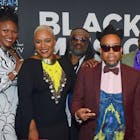
The Uniquely Alternative Legacy of Arrested Development
The Uniquely Alternative Legacy of Arrested Development
Published Thu, March 24, 2022 at 3:00 PM EDT
There wasn't anything in mainstream music quite like Arrested Development.
In the early 1990s, the mainstream space for "artsiness" was growing; as coffee shop liberals were caught up in an "alternative" spirit that was placing a premium on boho aesthetics and an outsider ethos. But Black artists from Fishbone to Spearhead struggled to find commercial footing, with so much of urban platforms dominated by new jack R&B and the more accessible rap sounds. Burgeoning movements like what would be conveniently dubbed "neo soul" were still a few years away, and it was into the melange of 1992 that this spiritually-informed, politically-invested, altogether unusual collective out of Atlanta emerged.
In Speech, the band boasted a frontman/leader whose creativity provided the band with a spiritual and musical fulcrum on which to launch a decade-spanning career. Born Todd Thomas, Speech was a Milwaukee transplant who'd moved to Atlanta in 1987 and met Timothy "DJ Headliner" Barnwell at the Art Institute of Atlanta. They'd started rapping together, and eventually adopted a socially-aware style steeped in the ethos of groups like Public Enemy and their own growing Black awareness.
"Public Enemy helped me overstand musically what we were trying to convey living in the South," Headliner told Creative Loafing in 2016. And he pushed Speech, then known as "Peachy," to find his own voice.
"You'll never be Chuck D," he recalled. "You've got to define who you are as an artist."
DROP YOUR EMAIL
TO STAY IN THE KNOW

Around these two creatives, a uniquely diverse musical collective soon formed. It would come to include: Speech's cousin Montsho Eshe, a teenaged dancer who lent a visual element to their live show; drummer Rasa Don and his fiancee, singer Dionne Farris, both of whom met Speech and Headliner after an early performance. And they were also joined by Baba Oje, an elder statesman of Afrocentrism whom they met on the Art Institute campus and who became the group's "spiritual adviser."
"I went to Jamaica for a party when I was 18 years old," Speech recalled in 2017. "There were all these young people, hot women, and yet there were all these elders there. It was the first time in my life I had ever seen that, because usually in America, the elders did their thing and there was a generation gap, and the youth, we did our thing. It wasn't like that in Jamaica, and I really loved it; I loved being around the entire community. When I got back to America, I just stored in my heart that one day I would love to have somebody older in a hip-hop group."
And Headliner's embrace of his Southernness shaped so much of Arrested Development's identity and ethos. Hip-Hop's image had always been decidedly urban. But he came from a different place.
"It was already in me — how I grew up in Savannah and all the history that was instilled in us as children," he said in 2016.
The group's debut album 3 Years, 5 Months and 2 Days in the Life Of... made them immediate stars and critical darlings. Released after three years of stress and wrangling (hence the famous title), it would sell six million copies and earn the group widespread acclaim, appearing on year end polls and lists. And lead single "Tennessee" became one of the defining songs of the early 1990s. Speech's mournful look at grief and ancestral connections, the song was an unusual entry in the Billboard Top Ten.
"Was it a religious song? Nah," Speech told RTB in 2020. But it was definitely an emcee pouring out his heart from his spiritual perspective."
Echoing their heroes Public Enemy, the group was tapped by Spike Lee to record an anthem for his upcoming film. Arrested Development's "Revolution" was released on the soundtrack for Lee's Malcolm X biopic X in late 1992, and A.D. followed that successful single with an appearance on MTV's popular Unplugged series, with that live album seeing official release in 1993. The group was one of music's biggest success stories.
The mainstream rap landscape was undergoing a shift, however. As artists like Snoop Doggy Dogg and Dr. Dre, The Notorious B.I.G., Wu-Tang Clan and Nas had emerged as top artists in Hip-Hop, and street-oriented rap was finding mainstream appeal via the slick beats or producers like Dre, Warren G and Sean "Puffy" Combs and his Hitmen. It was in this changing climate that Arrested Development released their sophomore album, Zingalamaduni, in 1994.
Suddenly, Arrested Development's visibility had nosedived. The singles from Zingalamaduni were well-received, but failed to reach the commercial standing the group had seen on their debut. At the height of Death Row and Bad Boy Records' respective runs, songs like "Ease My Mind" and "Africa's Inside Me" were anomalies. The kind of music Arrested Development had helped bring to the mainstream was being re-branded by some commentators as niche.

The commercial failure of their sophomore album started what would become an extended period of discord for Arrested Development. Farris had departed the group for a solo career soon after the initial success of 3 Years.... And the creative bonds between Speech and Headliner had deteriorated.
“[It was] youthfulness,” Speech would tell HipHopDX in 2017. “It was about simply not knowing the best way to deal with our conflicts. We were a very organic type group — not a lot of contracts, business talks, et cetera, but more so creativity and vibes. But when you start making a lot of money and getting a lot of fame on top of that, you either learn or burn quick.”
And in 1996; less than three years after they were named "Band Of The Year" by Rolling Stone and their Best New Artist Grammy win, the group disbanded. But Arrested Development would reunite in 2000, with a rejuvenated Speech and a reinvigorated lineup.
The group pushed forward, with bassist Isaiah 'Za' Williams III and vocalist Nicha Hilliard having joined in 1996; and adding guitarist "JJ Boogie" Reichert and vocalist One Love. But A.D. continued without Headliner and stylist/vocalist Aerle Taree. Nonetheless, throughout the 2000s and 2010s, Arrested Development became one of music's most formidable live acts and sustained a consistent independent career, dropping albums like Among The Trees, Strong and Changing The Narrative via Speech's Vagabond Records.
Arrested Development became a model for consistency in the face of change, as new faces would come onboard; vocalist/choreographer Fareedah Aleem and Tasha Larae joined the group; as Montsho-Eshe would eventually depart Arrested Development, as would Rasa Don. Elder Baba Oje died of leukemia in 2018.
Throughout all of the change and growth, heartache and high points; Speech has been the constant. His creativity and passion fueled Arrested Development in the face of everything.
"I tend to be a pessimistic optimist. I have optimism, but I have a lot of pessimism in me, too," he told RTB. "I feel like I need the optimism to crawl out of my own feelings of pessimism. Way back on the first single I said 'Problems got me pessimistic.' I talk about pessimism a lot because it's a real part of my character. But at the same time, I've got to flip it and give something that has some hope. Both for me – and because I hope that it will affect other people, too."
Over the years, the aesthetic and the approach that Arrested Development introduced would come to inform other artists seeking to forge a path against the grain of what's often presented in urban music. From the Dungeon Family to Black Hippy to artists like H.E.R. and EarthGang, one can see the ripple effect of Arrested Development's breakthrough. They mainstreamed a certain brand of Afrocentricity that was earthy and ethereal, spiritual and communal. It may have seemed out of step with the times at the time, but that was the point of it all.
In the past few years, Arrested Development has released two of the group's most well-received, Configa-produced projects in years, 2020s Don't Fight Your Demons, and 2021s For the FKN Love. Despite both projects being critically-acclaimed, and with Arrested Development's visibility higher than it's been since the group's 1990s heyday, Speech shocked fans in early 2022 when he announced that the group's run is, more than likely, over.

"I've been doing this professionally for over thirty years," he would explain to RTB. "So, like, I've seen extreme highs, I've seen very huge lows. It gets to a point; when you're putting a lot of effort into a project: you're writing on it, you're producing it, you're bringing in other musicians, guitar, bass, other singers and vocalists; you're paying publicists to promote it, you're paying for marketing people, blah-blah-blah. And the residual return on that is way less than what you're putting out."
One hopes that Arrested Development continues to deliver new music and add to it's already-significant legacy, but if this does mark an ending for the creative collective out of Georgia, everyone who has ever been a part of that extended A.D. family can hold their head high. The history of Arrested Development is one of inspiration and perseverance; of creativity and self-actualization. And that is a legacy that will always be worth celebrating.






